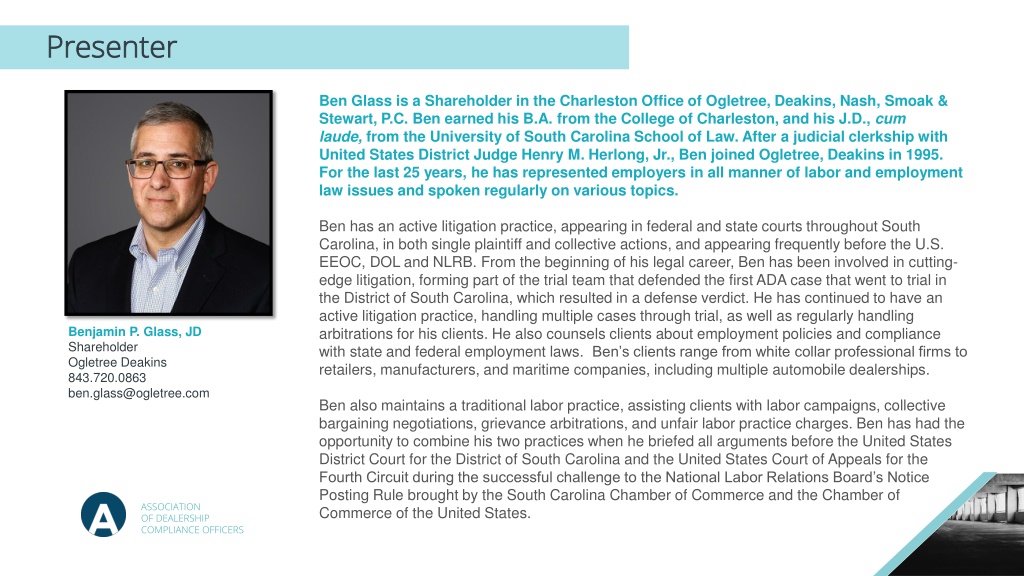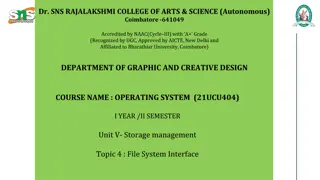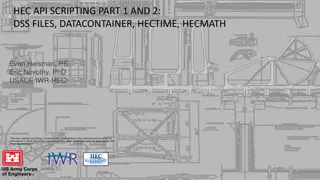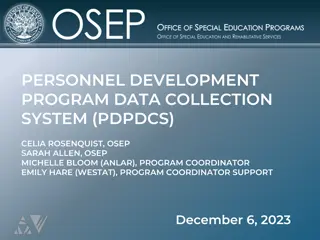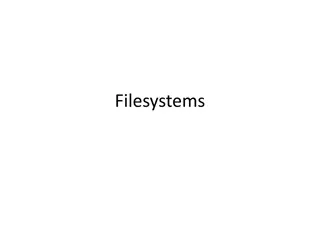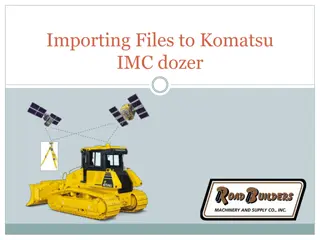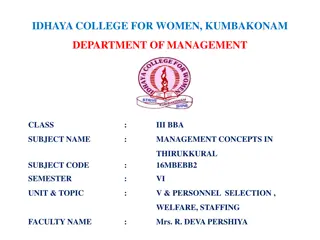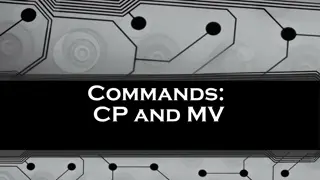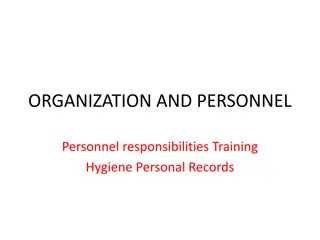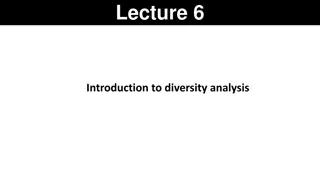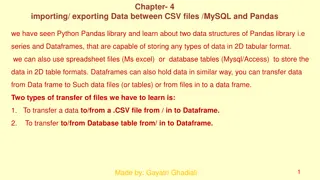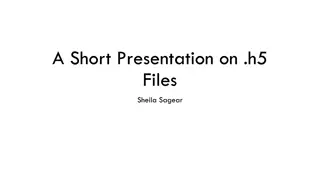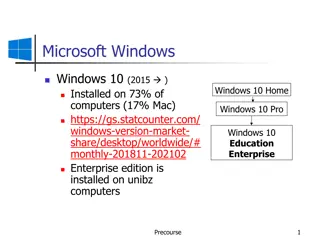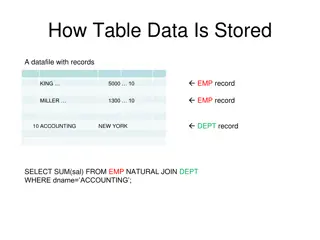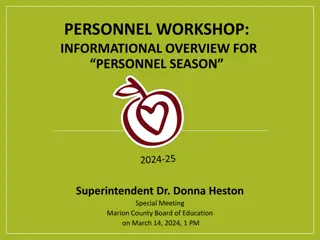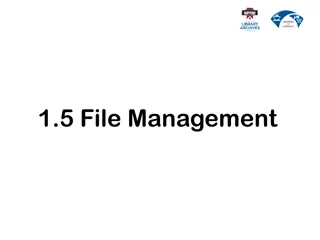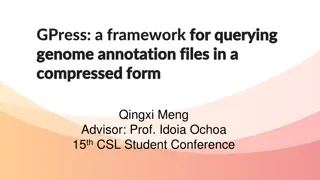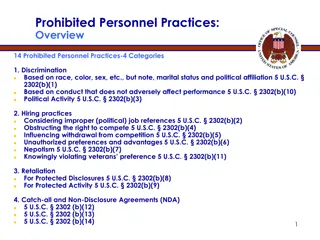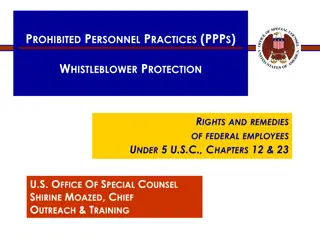Understanding Best Practices for Managing Personnel Files
Benjamin P. Glass, a Shareholder at Ogletree, Deakins, shares insights on the purpose, contents, confidentiality, and liabilities associated with personnel files. He emphasizes best practices to mitigate risks and maintain compliance with employment laws.
Download Presentation

Please find below an Image/Link to download the presentation.
The content on the website is provided AS IS for your information and personal use only. It may not be sold, licensed, or shared on other websites without obtaining consent from the author. Download presentation by click this link. If you encounter any issues during the download, it is possible that the publisher has removed the file from their server.
E N D
Presentation Transcript
Presenter Presenter Ben Glass is a Shareholder in the Charleston Office of Ogletree, Deakins, Nash, Smoak & Stewart, P.C. Ben earned his B.A. from the College of Charleston, and his J.D., cum laude, from the University of South Carolina School of Law. After a judicial clerkship with United States District Judge Henry M. Herlong, Jr., Ben joined Ogletree, Deakins in 1995. For the last 25 years, he has represented employers in all manner of labor and employment law issues and spoken regularly on various topics. Ben has an active litigation practice, appearing in federal and state courts throughout South Carolina, in both single plaintiff and collective actions, and appearing frequently before the U.S. EEOC, DOL and NLRB. From the beginning of his legal career, Ben has been involved in cutting- edge litigation, forming part of the trial team that defended the first ADA case that went to trial in the District of South Carolina, which resulted in a defense verdict. He has continued to have an active litigation practice, handling multiple cases through trial, as well as regularly handling arbitrations for his clients. He also counsels clients about employment policies and compliance with state and federal employment laws. Ben s clients range from white collar professional firms to retailers, manufacturers, and maritime companies, including multiple automobile dealerships. Benjamin P. Glass, JD Shareholder Ogletree Deakins 843.720.0863 ben.glass@ogletree.com Ben also maintains a traditional labor practice, assisting clients with labor campaigns, collective bargaining negotiations, grievance arbitrations, and unfair labor practice charges. Ben has had the opportunity to combine his two practices when he briefed all arguments before the United States District Court for the District of South Carolina and the United States Court of Appeals for the Fourth Circuit during the successful challenge to the National Labor Relations Board s Notice Posting Rule brought by the South Carolina Chamber of Commerce and the Chamber of Commerce of the United States. ASSOCIATION OF DEALERSHIP COMPLIANCE OFFICERS
Legal Protection Or Landmine? Managing Risk With Employee Files ADCO Human Resources Compliance Conference Presented by: Benjamin P. Glass (Charleston) February 24, 2021
First, The Disclaimer Ogletree, Deakins, Nash, Smoak & Stewart, P.C. is appearing at this conference as a service to ADCO and it s affiliates, and this appearance does not create an attorney-client relationship that did not previously exist with any individual or company attending the conference. The information presented here is for general informational purposes only and is not intended to constitute specific legal advice to any individual or company attending the conference. For legal advice on a specific matter, one should seek the advice of counsel familiar with the law of the state in which one operates, as many employment laws and requirements vary from state to state, and even city to city. The views and opinions offered in this presentation do not constitute the views or opinions of ADCO and ADCO does not warrant the accuracy or completeness of the content provided. ADCO undertakes no duty to correct, supplement, or update the information provided in this presentation.
Personnel Files: Shield or Sword? Topics Today The Purpose Of The Personnel File What Should Be In Personnel Files What Should Not Be In Personnel Files Confidentiality Concerns Retention Requirements Potential Liabilities and Landmines Best Practices For Personnel Files
Begin At The Beginning The overall purpose of a personnel file is to document employment-related decisions Will the document be helpful in making employment decisions Also tells the story of an employee s employment Will the document help a jury see what kind of employee they were Two general rules are: Only keep information that can legally be the basis of an employment-related decision; and Do not put anything in a personnel file that you would not want a jury to see
Records That Should Be Kept In A Personnel File The Basics Recruiting documents (applications, resumes, pre-employment test results) Job offers, employment or other contracts (confidentiality, non-competes) Benefit election forms Job descriptions Rates of pay and compensation Records of promotions and demotions Transfer/Layoff records Education and training records Policy and Handbook acknowledgments and agreements Termination records Post-employment records (Unemployment/COBRA)
Records That Should Be Kept In A Personnel File Telling The Story Performance evaluations and goal setting records Education and training records Employee recognition programs Attendance records (excluding doctor excuses) Warnings, counseling and disciplinary notices Customer complaints about employee
Records That Should Not Be Kept In A Personnel File Privacy And Legal Concerns Medical/Disability/Insurance records I-9 Forms Safety training records EEO Forms (invitations to self-identify) Reference/background checks Drug test results Child support or other garnishment orders Employee complaints of discrimination/harassment Investigative documents related to misconduct Payroll records
Restricting Access To Personnel Files Inside The Organization Maintain different types of records separately General personnel records Medical records Payroll records I-9 Complaints/Investigative records Only those who need or are legally required to have access to specific personnel files should have access Human Resources Generally have access to all records Supervisors General personnel, medical, and complaints/investigations as needed Payroll Personnel Time, attendance and payroll records
Restricting Access To Personnel Files Outside The Organization Maintaining records by type helps to firewall review by government and other auditing agencies Maintaining records by type helps to protect privacy of subject employee and others Limit production of records to the type of files involved in the investigation/audit (EEOC, OSHA, FMLA, Wage & Hour) Be prepared for pushback from government investigators
Records You Should Not Maintain Anywhere After-hours behavior Arrest records Personal financial information Club/union memberships Religious affiliation Political beliefs/party affiliation
Retention Requirements Check City, County, and State For Local Requirements Fair Labor Standards Act (FLSA) 2 years (recommended 3 years due to remedies for willful violation) Family and Medical Leave Act (FMLA) 3 years Title VII of the Civil Rights Act 1 year following the personnel action involved Age Discrimination in Employment Act (ADEA) 3 years Occupational Safety & Health Act (OSHA) Varies, depending on occupational illness or injury. However, generally duration of employment +30 years Uniformed Services Employment and Re-employment Rights Act (USERRA) No record-keeping requirement, but due to rights, should keep records of military leave for 5-6 years Office of Federal Contract Compliance Programs (OFCCP) 2 years following the date or making of the personnel action involved
Internal Retention Suggestion Five year recommendation And ONLY for five years Notethe exceptions for OSHA records relating to an employee s occupational illness or injury & USERRA leave records in the event a dispute arises
Additional Retention Obligations Threat of litigation/actual litigation An employer is obligated not to destroy any potentially relevant information after notice of the reasonable anticipation of litigation or service of a lawsuit or administrative charge This includes all electronically stored information (ESI), such as emails, IMs, text messages Must retain all potentially relevant information (regardless of file retention/destruction policy) Seek legal counsel
Potential Liability for Improper Record-Keeping Governmental Audits and Investigations Audit for recordkeeping compliance as well as substance E-Discovery Sanctions against employer Adverse inference jury instructions Discrimination and Retaliation Claims Poor recordkeeping can strengthen an employee s claim of discrimination and/or retaliation Must be able to prove legitimate basis for the employment action it just didn t work out doesn t cut it Keep certain documents out of personnel file to prevent any inference of discrimination (e.g., I-9 forms)
Legal Protection Or Landmine? Managing Risk With Employee Files Benjamin P. Glass Ogletree, Deakins, Nash, Smoak & Stewart, P.C. 211 King Street, Suite 200 Charleston, SC 29401 843-720-0863 ben.glass@ogletreedeakins.com
